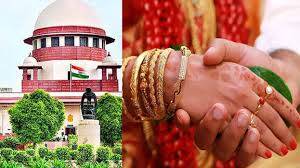

Marriage is based on love and trust between two people. It requires mutual compromises and respect to proceed warmly. Divorce used to be a rare event in the past, but now it has become something that can happen at any time in any marriage. Couples fighting, even on the verandahs of family courts, have become recurring events. Unlike in the past, the present generation of women are educated, more aware of their rights and have jobs to stand on their own feet, which has led them to take the stand that they are not ready to suffer any hardship for the sake of marriage.
Despite this, one of the main reasons for divorce is property disputes and disputes over dowry. Although asking for and receiving dowry is legally prohibited, dowry is an arrangement that is still happening in our society. A misconception prevails in society that the husband's family has full rights to the property brought by the woman at the time of marriage. There are even incidents where divorce preparations are started after misappropriating the gold brought by the woman. In most divorce cases, the woman's family suffers more financial loss. This is also a major reason for the increase in divorces. A judgment passed by the Supreme Court yesterday in this context is very relevant. The Supreme Court has clarified that the husband has no control over the property brought by the wife at the time of marriage. The Court also reminded that the man has a moral obligation to return the gold even if he takes it and uses it in case of financial problems. In the divorce case of a couple from Kerala that came before the court, the court also directed the husband to pay Rs 25 lakh to the wife in lieu of the gold.
In 2009, the woman complained that on their first night her husband had taken the 89 sovereigns of gold given by her family during their marriage saying it was for safekeeping and the mother-in-law later misappropriated the gold to pay off old debts. In 2011, the family court upheld the woman's claim and ordered compensation. However, quashing the order, the High Court ruled that it was not possible to prove that the husband and mother-in-law had misappropriated the gold. The complainant then approached the Supreme Court. Observing that the High Court has failed to judge the facts fairly, the Supreme Court ruled that the property a woman receives from her own family during marriage is not the equal property of the husband and the wife, and the husband has no independent authority over it. The court also opined that the dowry is the property of the woman. This judgment of the Supreme Court should become a guide in subsequent divorce cases.